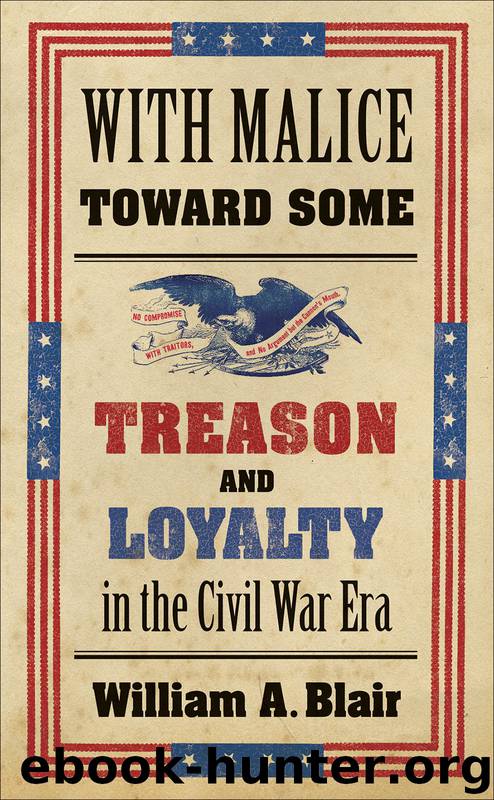With Malice Toward Some by Blair William A.;

Author:Blair, William A.;
Language: eng
Format: epub
Publisher: The University of North Carolina Press
Published: 2014-03-06T16:00:00+00:00
7: Free Elections or a Free Fight
Touring America in 1864, Frenchman Ernest Duvergier de Hauranne encountered a startling scene in St. Louis. The state of Missouri struck him, as it did Union officials, as not a loyal state for the Union but as a rebel region that endured occupation by a Union army in which southern sympathizers seethed with repressed rage. Unionists overreacted “by treating as a traitor anyone who offers resistance—even if it be perfectly legal—to their policy.” On September 15, he encountered a riot that revealed the passion behind the debate over loyalty. Two political meetings took place a short distance apart: one to launch a Republican club and another to honor George Brinton McClellan, the Democratic challenger for president. Each party tried to outdo the other with bonfires and fireworks. Speakers stood on platforms surrounded by banners, placards, and lanterns that projected slogans. Suddenly, the event turned ugly. Laughter in the Democratic crowd turned to shrieks as placards and lights disappeared. In the confusion, de Hauranne made out what he thought were uniforms among the attackers. Bayonets flashed and civilians froze against walls as if fearing to be shot. When the situation settled, they moved away slowly. What was the meaning of the fistfights, the rock throwing by soldiers, the rifle-butts rising and falling, the officers walking with swords among the populace? He answered his own question: “The military had decided the meeting would not take place.” Down went the lamps, posters, speaking stand, and banners bearing the name of McClellan. A gang of boys directed by men in uniforms smashed “the Rebels’” platform into splinters. A sullen crowd moved on, mumbling “‘Those damnded soldiers!’”1
Such was a presidential campaign during the Civil War. In 1864, political rallies in areas such as St. Louis were hardly for the timid as they underscored the tensions that could wrack communities, especially in the border states. Missouri was somewhat exceptional, to be sure, and there were discrepancies about who tossed the first stones at whom in this riot: Democrats or soldiers.2 Violence during the 1864 campaign reared its head in various corners of the loyal states, reflecting an intensified level of the “normal” kinds of rough play that constituted politics in the nineteenth century. Before the war, Democratic gangs in Baltimore and New York had salted the political process with violence by stabbing at the legs of opponents who stood in precinct lines or bumping their shoulders. In the Civil War, the presence of the national state introduced a wild card to elections—especially because it was not always controlled from above but gained its impulse from below, such as in this story. Lincoln hardly directed this St. Louis riot from Washington. In this case, the signs point to a spontaneous confrontation from an unknown igniter.
The presidential election remains a marvel among historians—not for its results, but for why it happened at all. The Civil War featured one of the greatest trials in the history of the United States. The country fought for its existence.
Download
This site does not store any files on its server. We only index and link to content provided by other sites. Please contact the content providers to delete copyright contents if any and email us, we'll remove relevant links or contents immediately.
| Africa | Americas |
| Arctic & Antarctica | Asia |
| Australia & Oceania | Europe |
| Middle East | Russia |
| United States | World |
| Ancient Civilizations | Military |
| Historical Study & Educational Resources |
1861 by Adam Goodheart(1049)
Smithsonian Civil War by Smithsonian Institution(1010)
Abraham Lincoln: A Life, Volume 2 by Michael Burlingame(970)
The Fiery Trial by Eric Foner(940)
Battle Cry of Freedom by James M. McPherson(937)
Ulysses S. Grant by Michael Korda(934)
Rock of Chickamauga(927)
Rebel Yell: The Violence, Passion, and Redemption of Stonewall Jackson by S. C. Gwynne(917)
101 Things You Didn't Know About Lincoln by Brian Thornton(910)
Abraham Lincoln in the Kitchen by Rae Katherine Eighmey(865)
This Republic of Suffering: Death and the American Civil War by Drew Gilpin Faust(843)
Bloody Engagements by John R. Kelso(821)
Lincoln's Lieutenants by Stephen W. Sears(807)
Leaves of Grass by Walt Whitman(800)
Union by Colin Woodard(800)
The escape and suicide of John Wilkes Booth : or, The first true account of Lincoln's assassination, containing a complete confession by Booth(766)
1861: The Civil War Awakening by Adam Goodheart(755)
Rise to Greatness by David Von Drehle(737)
The Fiery Trial: Abraham Lincoln and American Slavery by Eric Foner(724)
